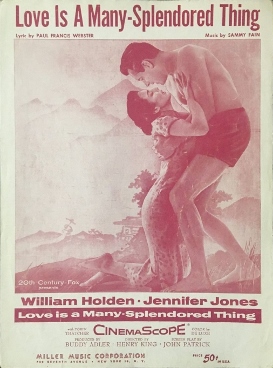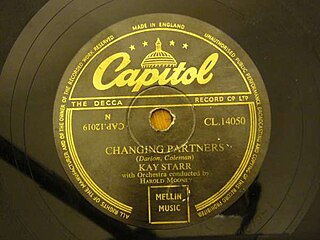
"Love Is a Many-Splendored Thing" is a popular song with music by Sammy Fain and lyrics by Paul Francis Webster. The song appeared first in the movie Love Is a Many-Splendored Thing (1955), and it won the Academy Award for Best Original Song in 1956. From 1967 to 1973, it was also used as the theme song to Love is a Many Splendored Thing, the soap opera based on the movie.
"If I Give My Heart to You" is a popular song written by Jimmy Brewster, Jimmie Crane, and Al Jacobs. The most popular versions of the song were recorded by Doris Day and by Denise Lor; both charted in 1954.

"Mr. Sandman" is a popular song written by Pat Ballard and published in 1954. It was first recorded in May of that year by Vaughn Monroe & His Orchestra and later that year by The Chordettes and the Four Aces. The song's lyrics convey a request to "Mr. Sandman" to "bring me a dream" – the traditional association of the folkloric figure. The pronoun used to refer to the desired dream is often changed depending on the sex of the singer or group performing the song, as the original sheet music publication, which includes male and female versions of the lyrics, intended.
"How Important Can It Be?" is a popular song written by Bennie Benjamin and George David Weiss, and published in 1955.

"Changing Partners" is a pop song with music by Larry Coleman and lyrics by Joe Darion, published in 1953. The best-known recording was made by Patti Page. It was also recorded the same year by Dinah Shore, Kay Starr and Bing Crosby.
"Pledging My Love" is a blues ballad. It was written by Ferdinand Washington and Don Robey and published in 1954.

"Vaya con Dios (May God Be With You)" ([ˈba.ʝa kon djos], literally "Go with God") is a popular song written by Larry Russell, Inez James, and Buddy Pepper, and first recorded by Anita O'Day in December 1952. Les Paul and Mary Ford had a No. 1 recording of the song in 1953. Members of the Western Writers of America chose it as one of the Top 100 Western songs of all time.
"(Ghost) Riders in the Sky: A Cowboy Legend" is a cowboy-styled country/western song written in 1948 by American songwriter, film and television actor Stan Jones.
"I Get Ideas" is a popular song which has been recorded by various musicians and used in a number of films and television episodes.
"I'll Never Stop Loving You" is a popular music song, with music written by Nicholas Brodzsky and lyrics by Sammy Cahn for the 1955 film Love Me or Leave Me. The song was published in 1955.
"I'll Get By (As Long as I Have You)" is a popular song with music by Fred E. Ahlert and lyrics by Roy Turk. The song was published in 1928. Versions by Nick Lucas, Aileen Stanley and, most successfully, Ruth Etting, all charted in America in 1929.
"Don't Take Your Love from Me" is a popular song written by Henry Nemo and published in 1941. Mildred Bailey first recorded this song in 1940 before publication. It was introduced that year by singer Joan Brooks.
"Sunday, Monday or Always" is a 1943 popular song with music by Jimmy Van Heusen and lyrics by Johnny Burke.
"I Can't Begin to Tell You" is a popular song with music written by James V. Monaco and lyrics by Mack Gordon. The song was published in 1945.

"Amor", also known as "Amor Amor" and "Amor Amor Amor" is a popular song.
"Domino" is a popular song written in 1950, with music by Louis Ferrari. The original French lyrics were written by Jacques Plante, and English lyrics were supplied by Don Raye.
"Takes Two to Tango" is a popular song, written by Al Hoffman and Dick Manning and published in 1952. Two versions of the song, by Pearl Bailey and by Louis Armstrong, charted in that year.
"I Apologize" is a popular song written by Al Hoffman, Al Goodhart, and Ed Nelson.

"Oh Baby Mine (I Get So Lonely)" is a popular song. It was written by Pat Ballard and was published in 1953.
"I Need You Now" is a popular song written by Jimmie Crane and Al Jacobs.






